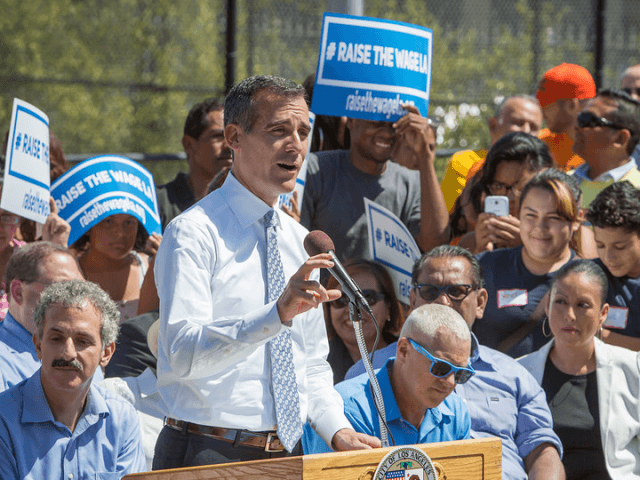On Tuesday, the Los Angeles City Council passed a minimum wage law by a 14-to-1 vote margin that continually cranks-up wages for the next five years to $15 an hour. Meanwhile, employers are responding by investing in machines over people.
Four in 10 employers surveyed in the eighth annual poll by the Los Angeles County Business Federation say they expect to hire more people this year, up 10 percent over last year. But the numbers of employers that say they intend to make the type of capital investments that eliminate jobs through automation doubled, to 59 percent.
The eighth annual “BizFed” poll found that two-thirds of participants believe business conditions have improved this year over 2014. About 25 percent of those surveyed said they are planning an expansion within California, versus less than 20 percent last year.
Despite what should herald a tremendous hiring boom in Los Angeles County, the “Dead Hand of Government Impoverishes the Middle Class” through a combination of high taxes, restrictive regulations, excessive permitting–and minimum wage hikes.
Tracy Rafter, founding Chief Executive of the Federation, commented on this year’s results, “Hiring, which it’s a bit better, is not where things are growing–they’re growing in technology,” because, “People cost so much more than technology over time.”
L.A. businesses are especially frustrated with the bureaucratic nightmare they experience dealing with of local, county and state building and safety planning departments. The BizFed poll found that the burden of securing operating permits was the most frustrating issue for local businesses, other than taxes and compliance fees.
For companies that do expand, they “must navigate what’s been called a spaghetti bowl of permit requirements”, according to the Times. Rafter worries that technological advancements have made it easier for frustrated local companies to just go “mobile” and conduct the bulk of their business elsewhere.
The Center for Jobs & the Economy published a study last week entitled, “Economic Tale of Two Regions: Los Angeles County vs. Bay Area.” The report revealed that Silicon Valley has been subject to far less direct regulation and therefore can pay higher salaries than Los Angeles County. While the Bay Area saw 25.3 percent private sector job growth since 1990, Los Angeles County actually lost 1.2 percent of its jobs.
Due to anti-business burdens and costs, the City of Los Angeles won the booby-prize last year as America’s Poorest Big City, according to an analysis by the American Community Survey-based Census Bureau data. L.A.’s poverty rate of 17.6 percent made California the top poverty state overall, with a 16.8 percent rate.
Poll participants named Burbank and Long Beach as the most business-friendly cities in the county, followed by Glendale, El Segundo and Santa Clarita. Los Angeles was named by far the least friendly, with the People’s Republic of Santa Monica a close second-worst.
Ken Tiratira, Chief Operations Officer of Employers Group, which helped with the polling, told the Times, “It’s OK to invest in technology and better operations and efficiency and higher productivity.” But at the end of the day, we’d like to have a lot of good, higher-paying jobs here.”
Unfortunately, Tiratira’s comment sounds like Albert Einstein’s definition of insanity: “doing the same thing over and over again and expecting different results.”

COMMENTS
Please let us know if you're having issues with commenting.